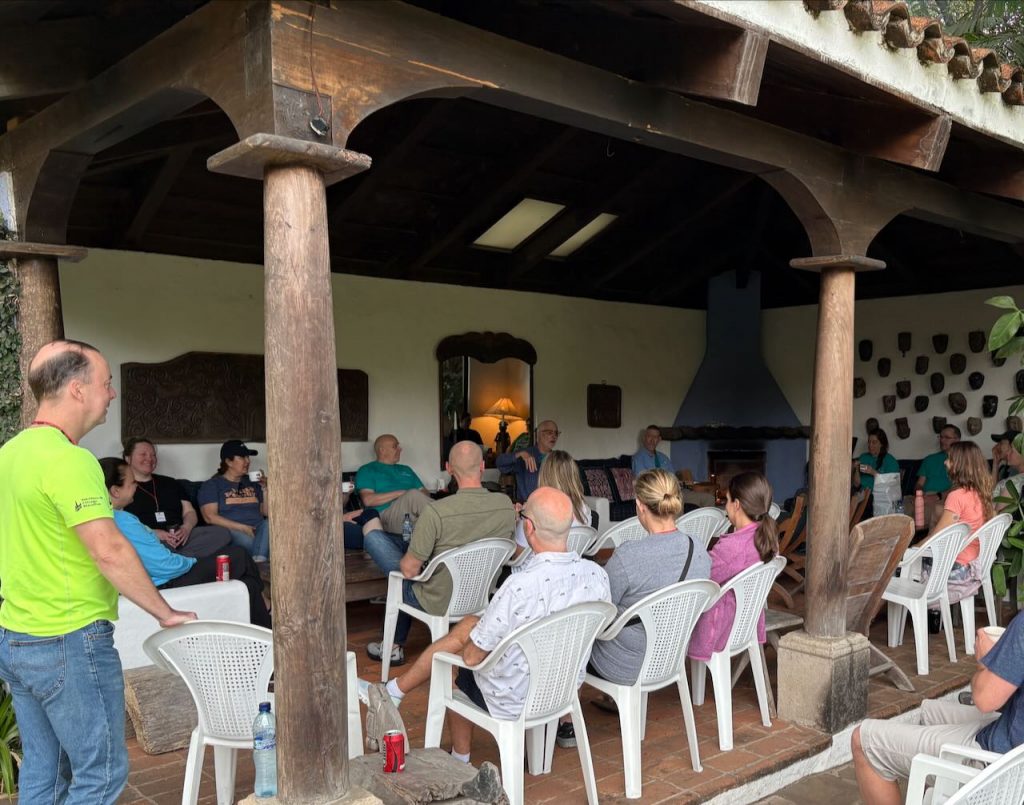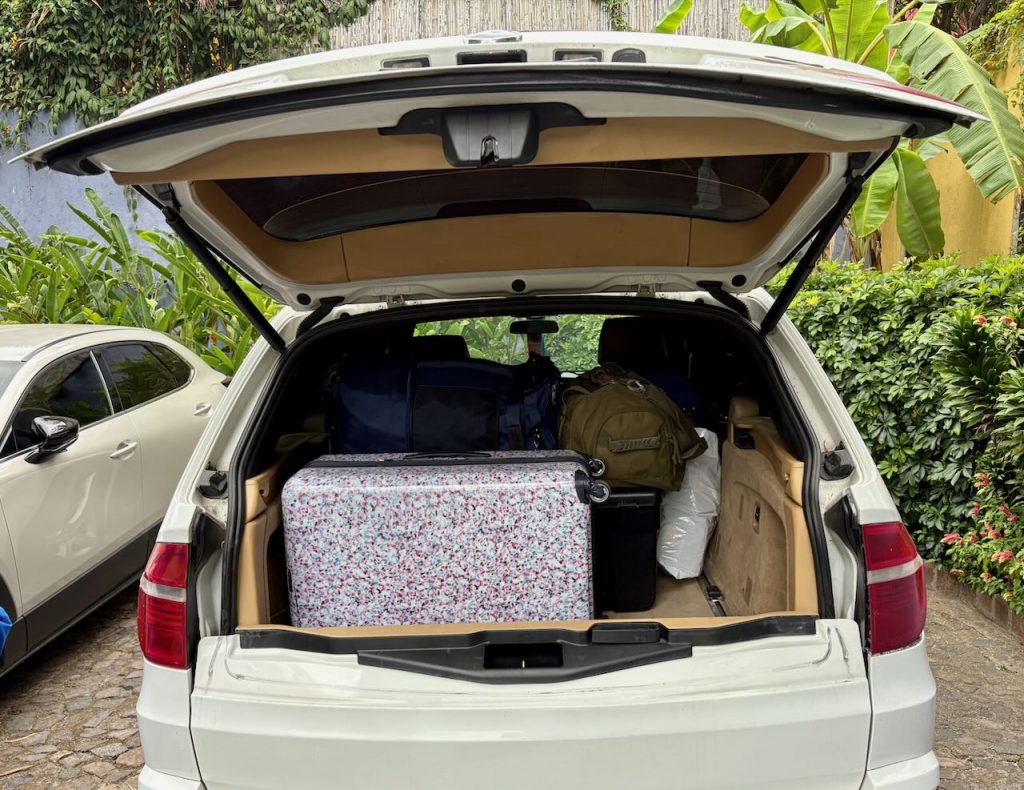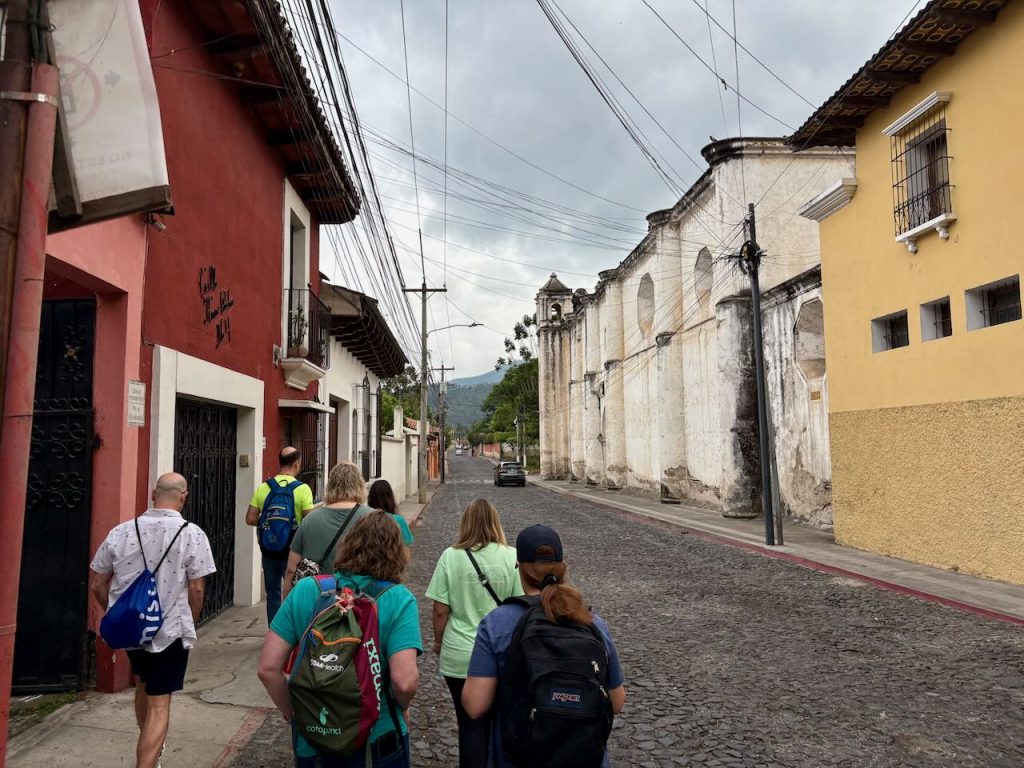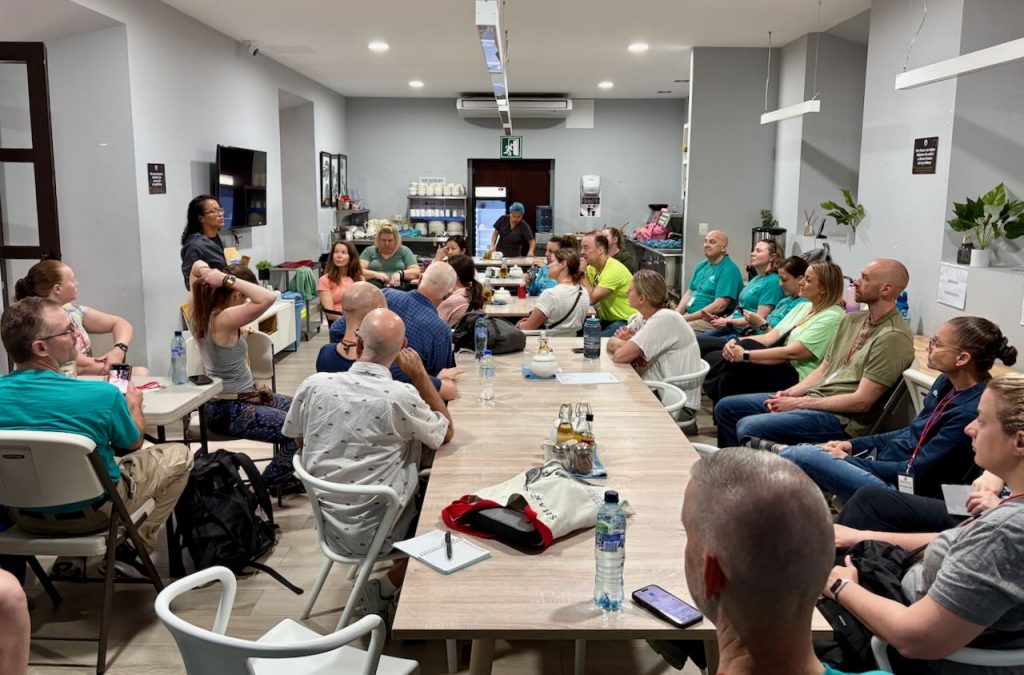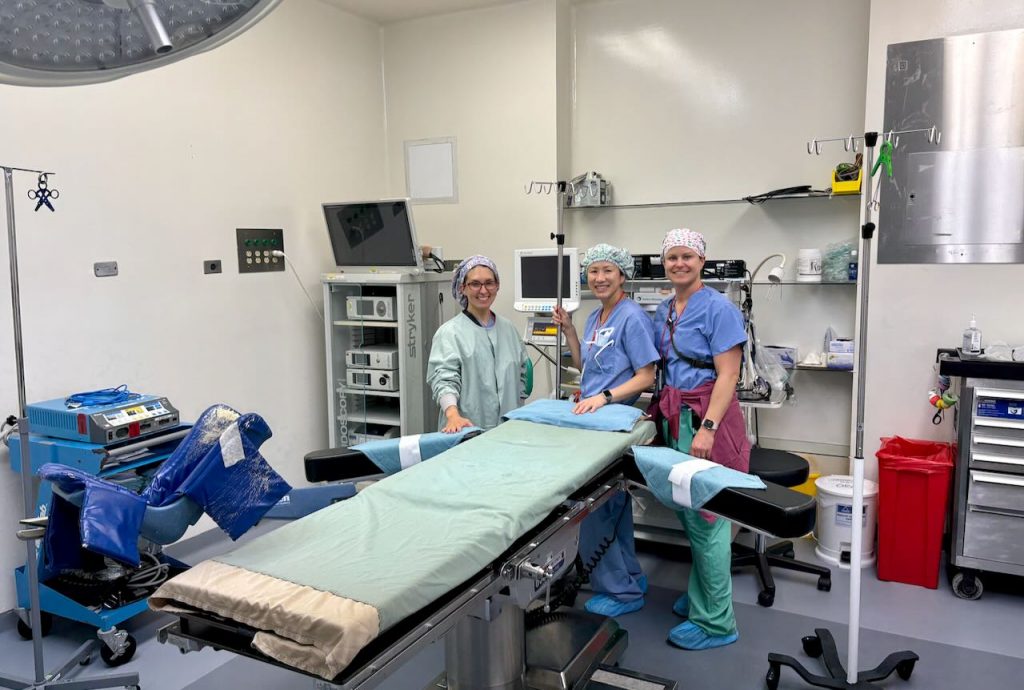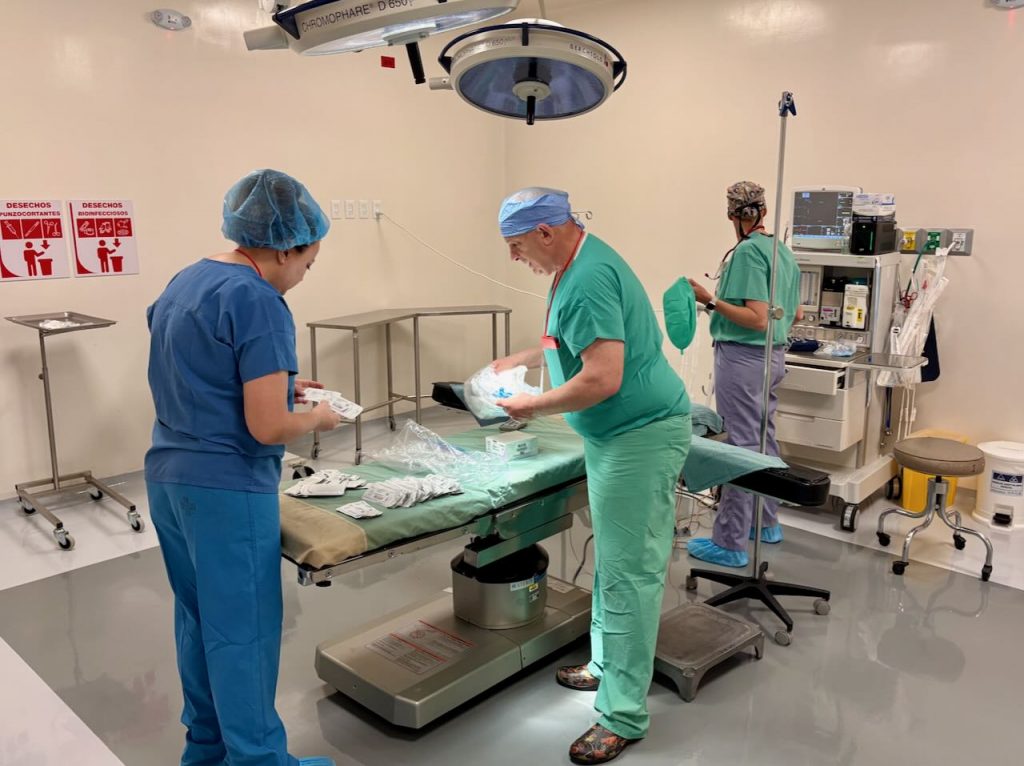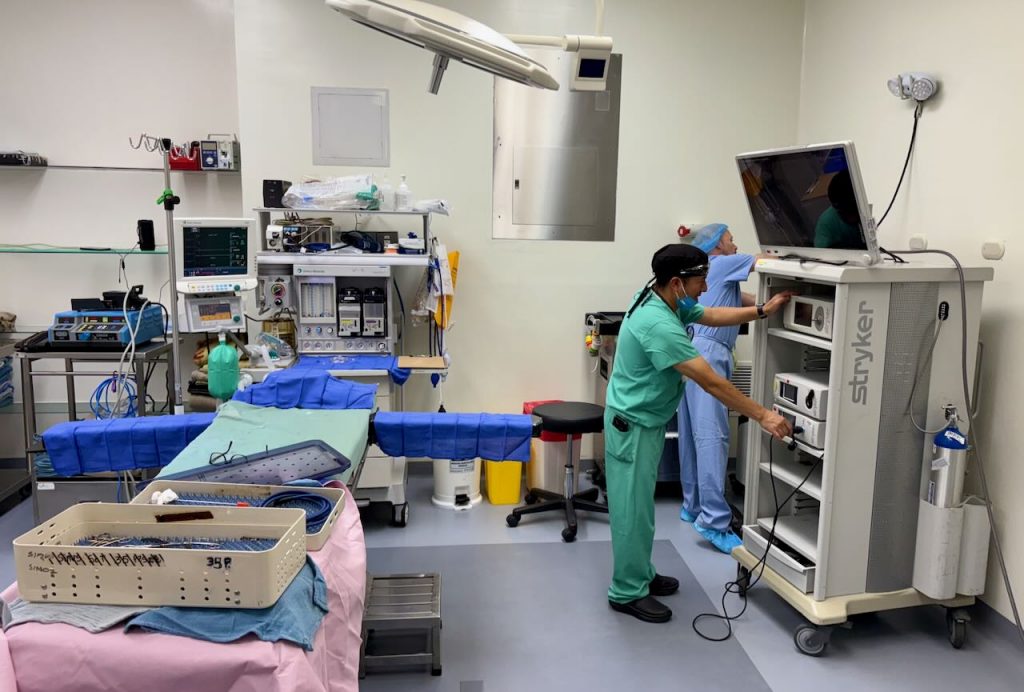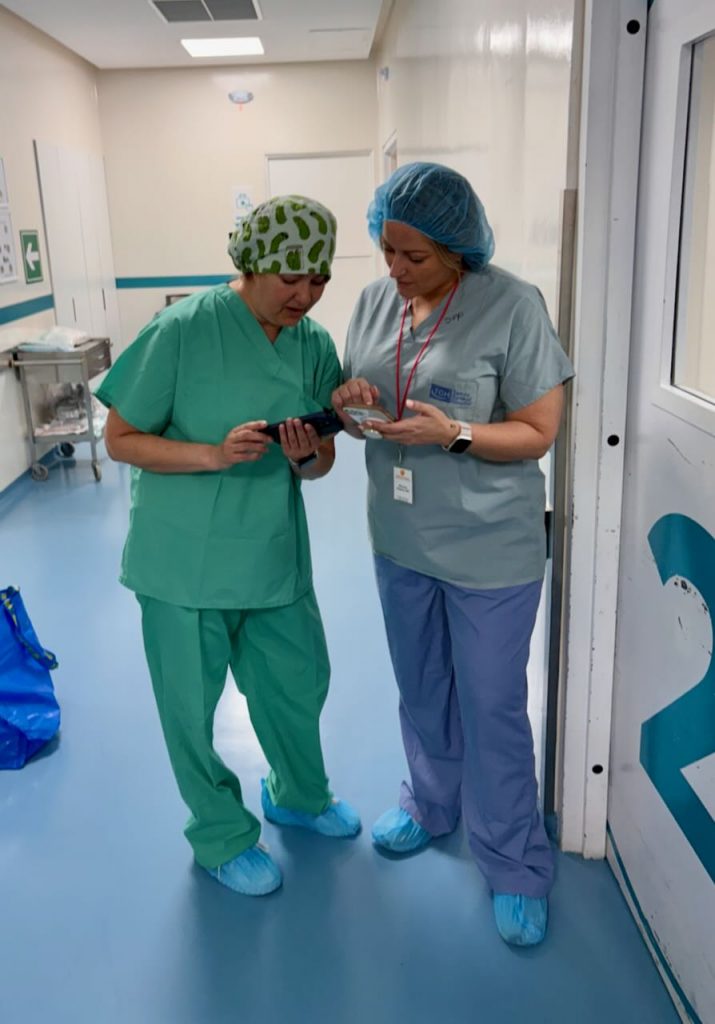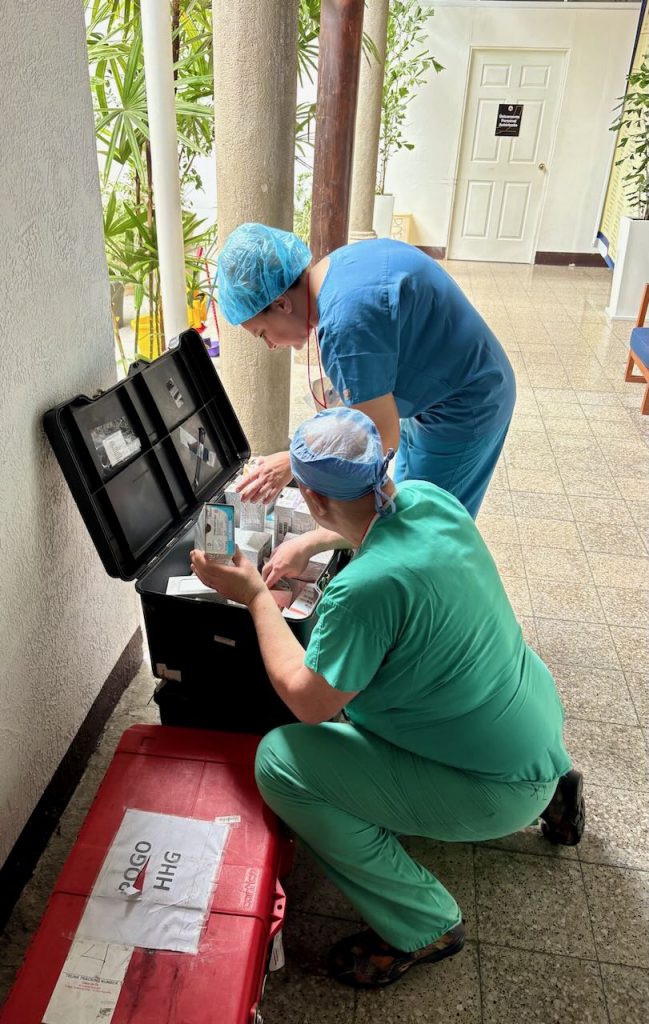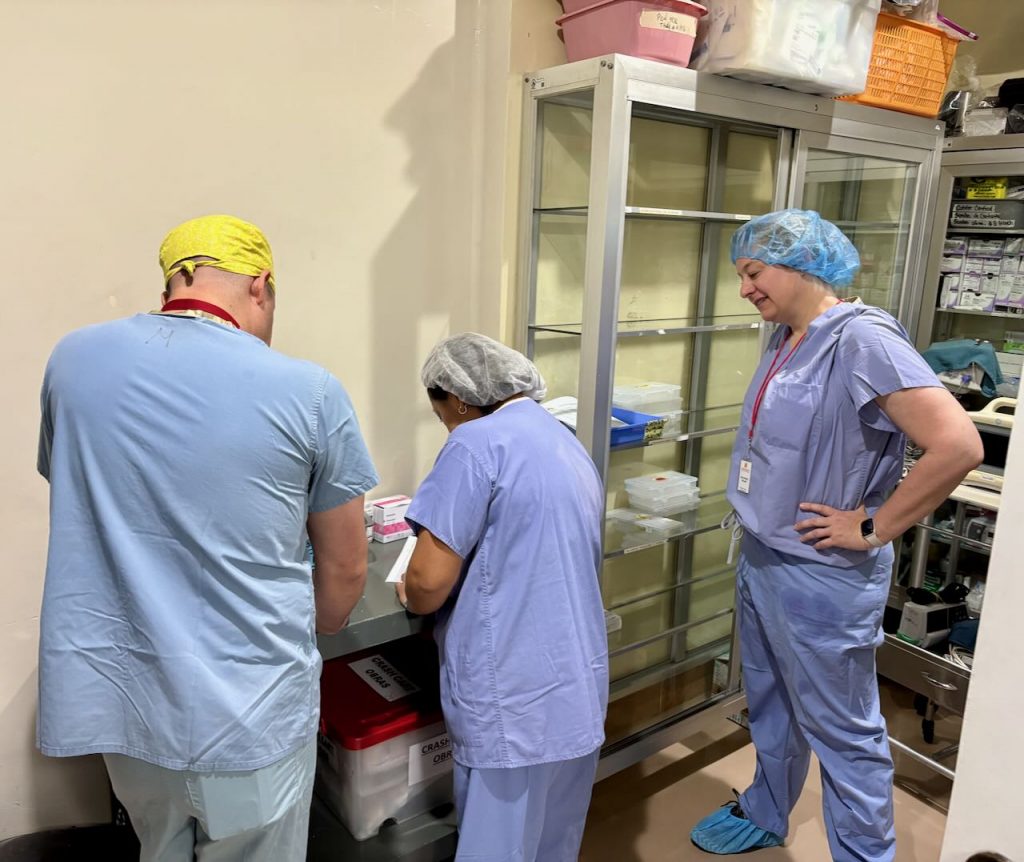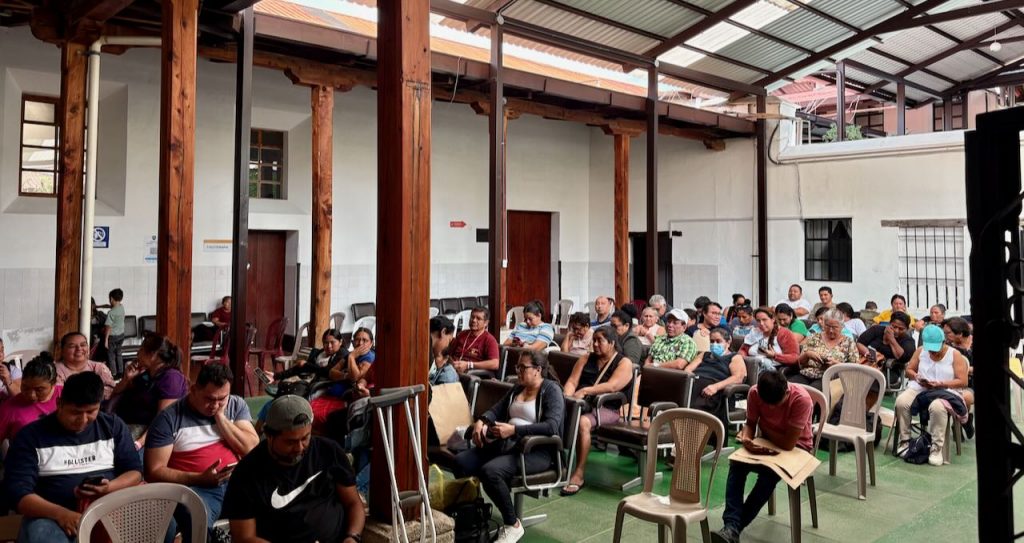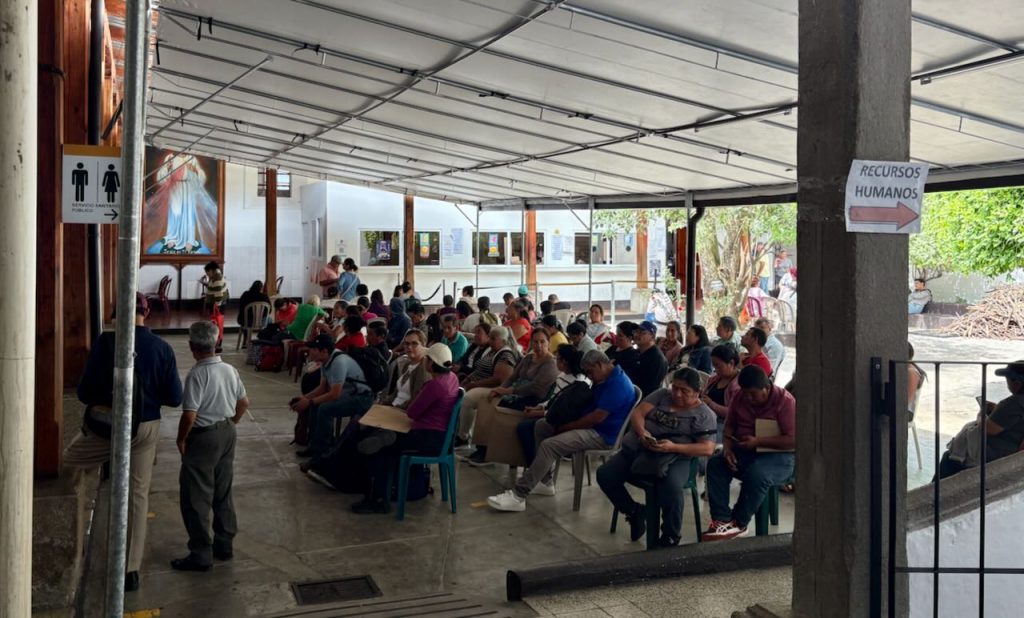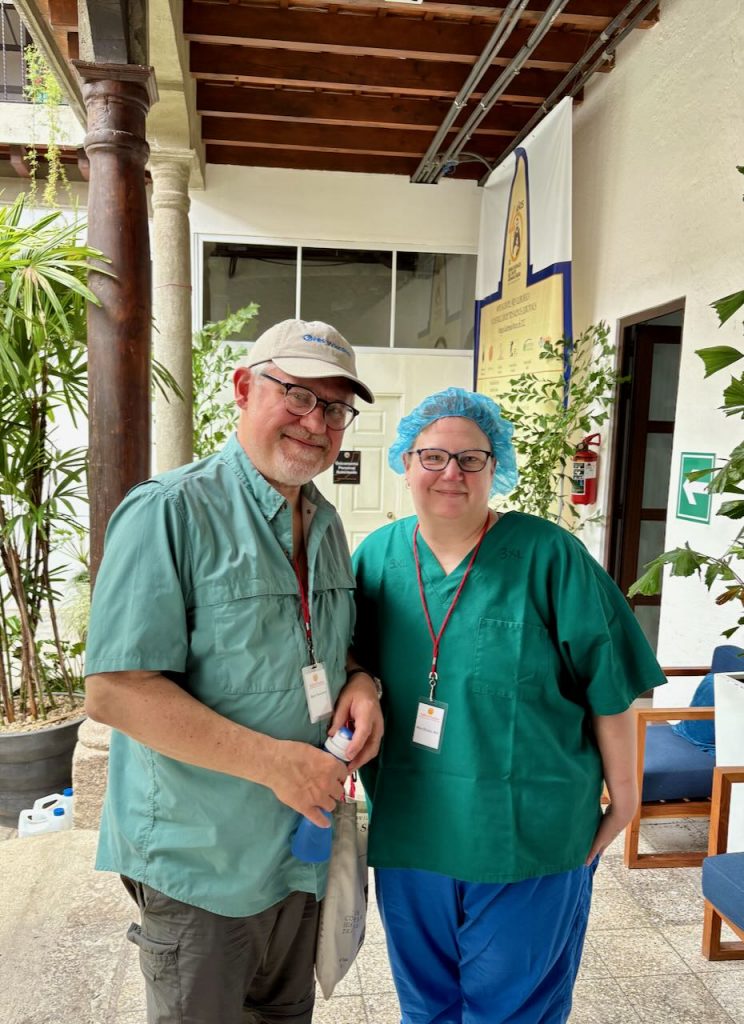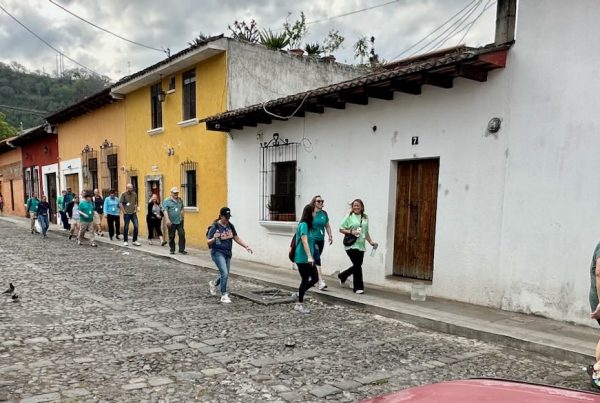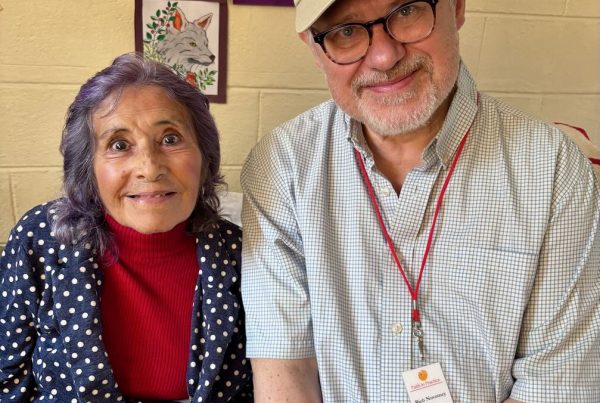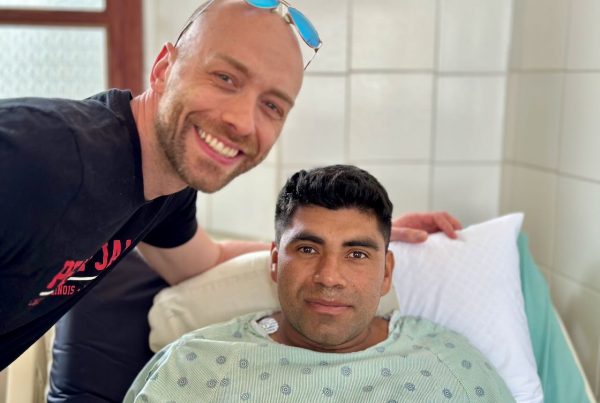Day 2 – Sunday, 11 May
Welcome to our second day, where our team sets up for the week’s work.
MORNING DEVOTIONAL:
Each morning our Chaplain Dennis will lead a group talk in a little covered patio at Hotel Quinta de las Flores. Dennis showed us this morning that he’s thoughtful, insightful and empathetic.
A few weeks ago he surveyed our group to get a read on each member’s beliefs and/or spirituality. Well, folks, Team Pogo includes shares of many different attitudes and perspectives. But as Pogo himself iterated after Dennis was finished, this mission unites everyone in our goal to help our fellow human beings, especially those of us who are underserved, neglected or unprivileged.
(See photo above of our group assembled for morning talk with Dennis.)
THE WALK TO OBRAS SOCIALES DEL SANTO HERMANO PEDRO:
Our hotel is about a 10 minute walk along the cobbled streets of ancient Antigua. However, we had three trunks of medical equipment as well as several suitcases of Beanie Babies and handmade gifts to take to the hospital to give as gifts to our patients. Those got conveyed in a car while the rest of us strolled through the old world streets of Antigua.
(See 2 photos above of trunk full of cases and Team Pogo walking to the hospital.)
TEAM BRIEFING:
Before getting started, Team Pogo assembled in the hospital’s cafeteria to make sure our American medical team would efficiently coordinate with the Guatemalan medical team. Maria, our Guatemalan Chief of Nursing, ran through a long and complicated list of issues and challenges both teams had to dovetail on. She covered everything you could imagine. This, my friends, is just a sliver of the preparatory work that goes on when conducting a medical mission in a different country where languages, practices and even laws don’t necessarily align.
Maria covered such topics as protocols to observe in the Operating Rooms (OR); patient documentation pre- and post-op; documentation regarding anesthesia, pharmacy and, of course, narcotics. What to do when other maladies are discovered that haven’t been scheduled for treatment (see Triage below about scheduling). And to make certain that anything documented in English is explicitly clear so the translators who come in later can accurately transcribe everything.
Watching all this reminded me of the skill, training, discipline and intelligence required of everyone in this room, of everyone on this team. I’m humbled to even be included here.
(See photo above of Pogo Team in cafeteria.)
OPERATING ROOM SET UP:
Next Team Pogo divided up into basically two separate groups:
1) Teams setting up the operating rooms and supplies
2). Surgeons interviewing prospective patients to see who could be treated this week. See Triage below.
Your blogger is not a medical professional, but one of the FIP Guatemalan specialists, Rodolfo, gave me kind and thoughtful instructions on how to put on scrubs so I’d be allowed into the OR. Don’t worry! I wasn’t there to meddle, just take photos. I feel it’s important to understand that medical OR protocols are very strict, and even on a day when no one was being operated on, EVERYONE suits up in scrubs, no exceptions!
Pogo Team nurses, technicians and medical assistants were busy as bees setting up supplies, machines and tools in several operating rooms. This took them most the morning.
(See 3 photos above of Pogo Team nurses and techs setting up operating rooms.)
MEDICAL SUPPLY SET UP:
Medical supplies are a big and very complicated deal, especially considering the fact that these are American doctors and nurses coming into a different country to conduct surgery and provide complicated medical care. The laws and practices regarding medical care are different between the United States and Guatemala, and not everything we will need for this week is readily available here.
As it was explained to me, after each FIP weekly mission, whatever supplies are not used are stored locally for the next team. Everything must be inventoried—before and after. The next team that comes in brings with them whatever additional supplies are needed. These trunks (shown on the Day 1 blog) would not get through Guatemalan customs if they are used or expired. In other words, a ton of behind-the-scenes work went on before any of us boarded a plane.
Finally, once at the hospital, our nurses and technicians needed to keep a strict eye on everything to make sure all operating rooms got supplied with everything they need.
(See 2 photos above. First, two of our nurses consulting lists on their smartphones against what they see stocked on the shelves. Second, two nurses searching through trunks for the last few missing OR supplies.)
PHARMACY SET UP:
The other big deal is the pharmacy. Our pharmacist Katie, from Fond-du-lac, Wisconsin, spent her set up day consulting with the Guatemalan team and with our surgeons to make certain that all of the drugs needed for the scheduled surgeries would be on hand, and that she’d also have supplies of the required drugs for post-op. There are two major hurdles to this: First, every drug here is labeled by its Spanish name and second, Obras Sociales Del Santo Hermano Pedro Hospital does not have everything in stock that will be needed for this week. Katie’s Guatemalan associates will help her order everything that’s missing from Guatemala City, which will be overnighted here for start of surgery tomorrow morning.
(See photo above of Katie working with two Guatemalan associates in the pharmacy office.)
TRIAGE:
The other half of set up day is our team’s group of surgeons and their specialized nurses conduction triage. This involves reviewing previously collected medical information for the many, many, sick, ailing or injured Guatemalans who have traveled to this hospital in hopes of relief. Many have traveled here for hours and hours. Our team of surgeons then interviewed, assessed and scheduled all the surgeries for this week, Monday through Thursday.
Triage like this involves a couple of major challenges:
1) LANGUAGE & PREVIOUS MEDICAL CARE. Needing to make major health and surgical decisions based on scant information in a different language, and
2) RESOURCES. Not being able to treat everyone who needs treatment.
FIRST, LANGUAGE & PREVIOUS MEDICAL CARE. Our team’s two OBGYN surgeons, Dr. Mary S. and D. Kris B., interviewed many women today, all of whom need help. Many of them had brought along prior medical exams or records. But often these were incomplete, and everything was in Spanish. The doctors worked with an excellent translator, however translating from one language to another—both the records and what the patient was saying during the interviews—was challenging. Translating detailed medical conditions is not the same as translating a novel. With care, experience and wisdom, these two surgeons made a lot of tough decisions today on who they could best help this week with the information they had.
I didn’t have the opportunity to speak to the other surgeons in triage, but I’m certain they faced similar challenges.
SECOND, RESOURCES: It’s a daunting balancing act. We want to treat as many people as absolutely possible. However, it’s impossible for us to do this without the partnership of our Guatemalan medical professionals here in Antigua. But there are simply not enough of them, and there are not enough physical medical resources. Many of the local professionals have to travel long distances to this hospital for work. For example, yesterday it took our bus almost 2 hours to travel just 22 kilometers. This means the OR only operates from 8 until 5, with the last scheduled surgery starts at 3:30. It does not pay to rush or to over schedule—that leads to bad outcomes. Our teams are dealing with the lives and welfares of patients, and the number one rule is to do no harm.
(Please see the two photos above I took of Guatemalan patients waiting for triage. There are two triage waiting rooms. I have a photo of one room and a photo of an overflow area.)
So many folks drive so many miles without any assurance that they’ll be seen or even scheduled for surgery. We are helping as many as possible and helping those with the most acute problems first. So yes, it’s heartbreaking. The good news is that there are other medical missions operating out of this hospital, and there will be other FIP medical missions.
SET UP DAY OVERALL OBSERVATIONS:
Finally, I have to give a shout out to all the various team members who are helping me learn. So many of you are dropping what you’re doing to answer my questions. I’m sharing a photo of one of our nurses, Kim H., who spent an about an hour with me today (after her set up work was done) explaining how much of this works and interrelates. I tried to take notes, Kim! So please know that any and all errors in this blog are mine!
(Please see the photo of Yours Truly with Nurse Kim. I’m the one in the baseball cap.)
SHOUT OUTS AND/OR QUOTES:
LEAD ANESTHESIOLOGIST ANNIE H. is here with FIP for her second trip. But since her first medical mission last year, she and her husband were relocated to Honolulu. A distance of over 4000 miles, multiple flights and serious jet lag did not stop Annie from joining for a second medical mission. Thank goodness the Guatemalan coffee is so excellent!
NURSE SHERRY M. was talking to me today about why she came back for this FIP Medical Mission, which is her second trip. I’m paraphrasing Sherry here, but she related to me that during her first trip here, she was helping a Guatemalan patient in the Post-Anesthesia Care Unit who had just come out of major surgery.
When the patient realized that their long held dream of healing had been addressed—a dream that seemed impossible because of money and inaccessibility—they were overcome with emotion and tears. They thanked Sherry for leaving her comfortable home in America, for leaving her comfortable life, to come down here to Guatemala to help someone like them. This life-changing gratitude is what Sherry chose to share with me today, to explain why she’s working here again.
RELATED NOTES AND THOUGHTS: RURAL GUATEMALAN FAMILIES
Living Water Adopt-a-Child, a global nonprofit, has a lot of good information on poverty and how it relates to health in Guatemala. Here’s some things I’ve learned (in my own words):
Family is central in Guatemala. Guatemalan children help contribute to their families because many family farms can’t afford to pay employees. Also, often the older children take care of their younger siblings so their parents can work. This contributes to young Guatemalans not being able to go to secondary school.
Many Guatemalan families have lived in these challenging conditions for so many generations, it’s the only way of life they know, the only life they can imagine. It’s incredibly difficult to break out of that. Guatemala is trying.
–Rich, Pogo Team Blogger
Photos for this entire week are by Jeff E. and Rich N.


